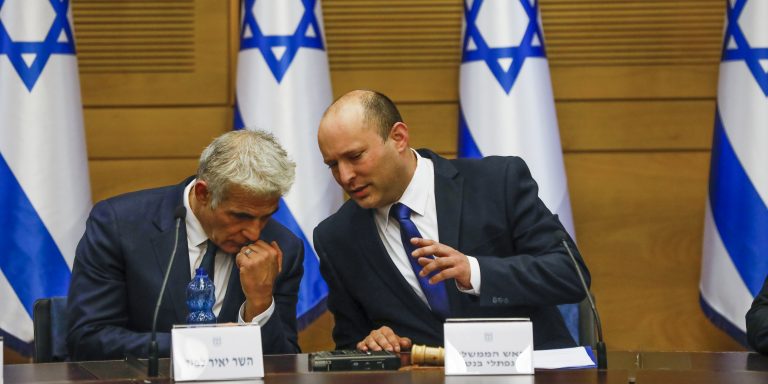INTELBRIEF
June 17, 2021
IntelBrief: As Israel Welcomes New Coalition Government, Same Challenges Persist

Bottom Line Up Front
- A vote in Israel’s Knesset ushered in a new coalition government and put an end to the long twelve-year tenure of Benjamin Netanyahu as prime minister.
- The coalition government comes on the heels of four inconclusive elections in less than two years, and includes a diverse bloc of political parties.
- World leaders, including U.S. President Joseph Biden and German Chancellor Angela Merkel, congratulated Israel’s new prime minister Naftali Bennett.
- Like Netanyahu, Bennett remains opposed to Palestinian statehood and is against U.S. efforts to renegotiate a nuclear deal with Iran.
A vote in Israel’s Knesset legislature on Sunday, June 13, ushered in a new coalition government and put an end to the twelve-year reign of longtime Israeli politician Benjamin Netanyahu as the country’s prime minister. Netanyahu, who before his most recent tenure also served as prime minister from 2006 through 2009, is a fixture of Israeli politics known for his far-right views. In recent years, he has become ensnared in several corruption-related scandals. The new government will be led by his former ally, Naftali Bennett, leader of the small, right-wing Yamina party and a self-described Jewish nationalist, former settler leader, and ex-defense minister. Bennett is against the formation of a Palestinian state, and similar to his predecessor Netanyahu, is opposed Washington’s efforts to engineer a return to the Joint Comprehensive Plan of Action (JCPOA), also known as the Iran nuclear deal.
The coalition government comes on the heels of four inconclusive elections in less than two years. It brings together diverse – even opposing – political views and positions, and comprises eight distinct political parties, including three right-wing parties; two left-wing parties; two centrist parties; and Raam, an Arab Islamic conservative party, led by Mansour Abbas. Yair Lapid, a secular centrist who will serve as foreign minister, is credited by some as the driving force behind the new government coalition, which has frequently been described as “fragile” since it passed Israel’s parliament with just a single vote—sixty to fifty-nine. The coalition was cobbled together following the most recent conflict between Israel and the Palestinians, which lasted for eleven days and resulted in another violent escalation. What was different about the latest round of fighting was the inter-communal violence that unfolded in Israeli cities with sizeable Arab populations, and the expressions of political discontent and frustration with the government among Israeli citizens. Addressing the fallout from interethnic violence will be a difficult challenge for the incoming government, which has been described as united more by what it stands against—primarily Netanyahu—than what it stands for.
U.S. President Joseph Biden wasted no time in welcoming Israel’s new prime minister, calling Bennett to congratulate him, and in a statement, remarking, “Israel has no better friend than the United States.” Other world leaders followed suit, including German Chancellor Angela Merkel; Canadian Prime Minister Justin Trudeau; British Foreign Secretary Dominic Raab; and European Council President Charles Michel. Among the top priorities of the new coalition government will be repairing ties with the U.S. Democratic Party. According to Lapid, “We find ourselves with a Democratic White House, Senate and House, and they are angry.” He vowed to repair the relationship and find areas of common ground.
Netanyahu has long described himself as tough on Iran, although many have argued that Tehran significantly expanded its influence throughout the Middle East during Netanyahu’s tenure. A close ally of former U.S. President Donald Trump, Netanyahu railed against the Biden administration in some of his final remarks, calling the Administration dangerous for Israel’s interests. Netanyahu also oversaw so-called normalization efforts with four countries—Bahrain, Morocco, Sudan, and the United Arab Emirates—in an effort to contain Iran and marginalize support for the Palestinians throughout the Arab and Islamic world. However, these efforts appear to have done little to quell popular sentiment in the region regarding the Israeli-Palestinian conflict. Upon news that Netanyahu would be leaving his role as prime minister, his opponents celebrated by dancing and singing in Rabin Square in Tel Aviv. Many of his supporters believe Netanyahu will return. He plans to remain in the leadership of the Likud party, where he would wield considerable power in the leadership of the opposition and has promised to stay actively engaged in politics.
The question many are wondering throughout the region is, how will a new Israeli government deal with some of the most pressing challenges inherited from previous governments? A right-wing nationalist march through Jerusalem this week led to clashes between Palestinian protesters and Israeli police, with the police firing rubber bullets. In response, the Palestinian militant group Hamas sent incendiary balloons into Israel, and the Israel Defense Forces (IDF) responded with airstrikes in Gaza. The tit-for-tat broke a ceasefire that had been in place for just a few weeks and touched off concerns of a broader conflagration and the potential for escalating violence. The violence is an early test for the new government, which is desperate to prove that it stands for something more than jettisoning Netanyahu. The formation of this coalition is an historic first in Israel, but now the hard part begins.